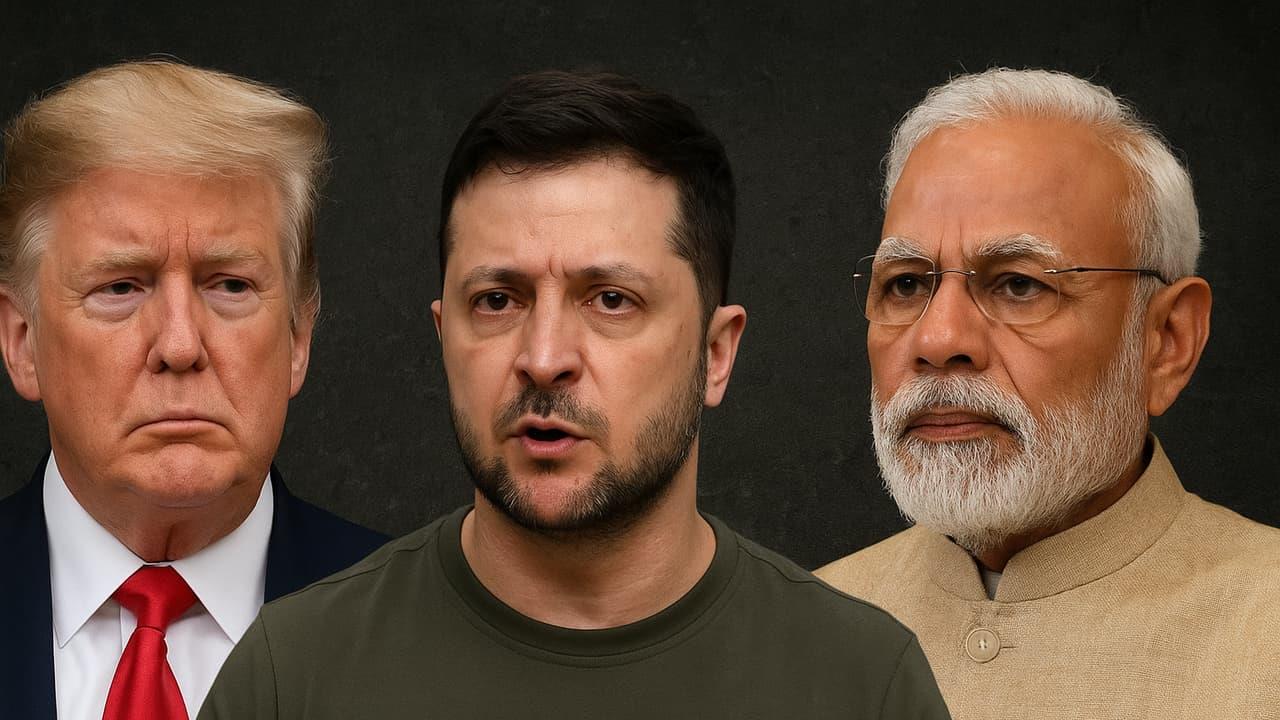
'Tariffs On India Crucial For Peace In Ukraine': Trump's Tariff Battle In US Supreme Court
The Trump administration on Thursday asked the United States Supreme Court to overturn an appeals court decision that found much of its sweeping tariff programme unlawful. In a fresh legal filing, the White House defended the use of emergency powers under the International Emergency Economic Powers Act (IEEPA) as a necessary tool to press countries, including India, to limit purchases of Russian energy during the war in Ukraine.
The filing argues that the tariffs, which were doubled to 50 per cent for India on August 27, are 'a crucial aspect' of the administration's efforts to respond to the national emergency created by Russia's invasion of Ukraine. The appeal adds that the lower court's decision 'casts a pall of uncertainty upon ongoing foreign negotiations that the President has been pursuing through tariffs', and could jeopardise deals the administration has been negotiating over recent months.
Legal fight and timeline
The US Court of Appeals for the Federal Circuit, sitting en banc, ruled that most of President Trump's IEEPA tariffs exceeded the statute's scope, but it stayed the ruling until Oct. 14 to allow the administration time to seek Supreme Court review.
The White House has since asked the Supreme Court to hear the case quickly, arguing in court papers that the tariffs, including a move to raise duties on some Indian imports to as much as 50% on August 27, are part of its response to the national emergency tied to Russia's war in Ukraine. The government also cited CBO estimates of large long-run budgetary effects from the tariffs and warned that the appeals ruling creates uncertainty for ongoing foreign negotiations.
What the Trump team says
The administration's court filing says the Federal Circuit did not dispute that the crises cited, including Russia's war in Ukraine and other threats to national security and the US economy, qualify as 'unusual and extraordinary threats' under IEEPA (50 U.S.C. § 1701(a)). Instead, the government argues, the lower court erred in its reading of the statute's scope.
Court papers cite a broad view of the tariffs' benefits. They note a Budget Office projection, referenced in filings, that the tariffs could reduce federal deficits by as much as $4 trillion in coming years. The White House also framed the duties as a tool to prevent trade retaliation and protect domestic economic strength, saying denial of tariff authority could expose the nation to retaliation and damage the US economy.
The administration further warned that the appeals court ruling creates legal and diplomatic uncertainty that could undermine ongoing foreign negotiations. "The decision casts a pall of uncertainty upon ongoing foreign negotiations that the President has been pursuing through tariffs over the past five months," the filing says.
#BREAKING on @ndtv: Trump Administration files appeal against the decision of the Court of Appeals declaring Trump's tariffs illegal. Trump Admin to SC:“We recently authorised tariffs against #India for purchasing Russian energy products to deal with a preexisting national... twitter/aKYFXvgSPl
- Aditya Raj Kaul (@AdityaRajKaul) September 4, 2025
How critics and officials have reacted
The Federal Circuit's majority opinion stressed limits on executive power, noting that IEEPA's emergency authority does not expressly grant the President a new taxation or tariff power. The 7-4 split reflects how sharply judges differ over the proper balance between national emergency authority and Congress's lawmaking powers on trade.
US President Trump reacted angrily to the appeals ruling, posting on his social platform that the court 'incorrectly said that our Tariffs should be removed', and that the United States 'will win in the end'. He vowed to press the case before the Supreme Court. Treasury Secretary Scott Bessent urged care in handling the legal outcome, warning that suspending the tariffs' effect could cause 'dangerous diplomatic embarrassment'. He argued that sudden policy reversals would unsettle foreign partners and trade talks.
If the Supreme Court upholds the Federal Circuit ruling, the administration would likely have to roll back many of the duties imposed under IEEPA. That could change the terms of ongoing negotiations, affect billions of dollars of trade, and prompt shifts in global supply chains. If the high court instead backs the administration, it would mark a significant expansion of executive power in the trade arena, potentially allowing future presidents to use emergency authorities to impose broad economic measures without fresh congressional approval.
Legal experts say the case raises fundamental questions about the separation of powers: whether emergency statutes written decades ago permit a modern president to impose sweeping trade penalties, or whether such measures require explicit congressional authorization.
The Supreme Court will decide whether to take the appeal. Given the high stakes, ranging from international diplomacy to economic policy and constitutional boundaries, the justices may move quickly. Meanwhile, the tariffs remain in place for now under the appeals court's temporary order. Whatever the Court decides, the litigation has already reshaped business expectations and diplomatic planning. Governments and companies watching closely will need clarity soon to plan contracts, shipments and negotiations that depend on predictable trade rules.
Legal Disclaimer:
MENAFN provides the
information “as is” without warranty of any kind. We do not accept
any responsibility or liability for the accuracy, content, images,
videos, licenses, completeness, legality, or reliability of the information
contained in this article. If you have any complaints or copyright
issues related to this article, kindly contact the provider above.


















Comments
No comment